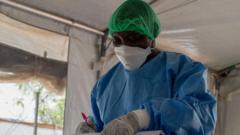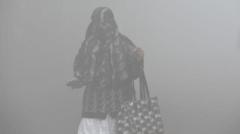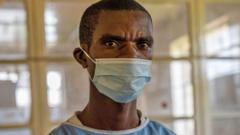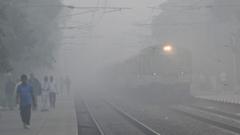The Democratic Republic of Congo faces a significant outbreak of mpox, particularly in Kinshasa, exacerbated by a vulnerable population and inadequate vaccine rollout. The WHO has classified it as a global health emergency, prompting urgent responses to curb its spread.
Mpox Outbreak in Kinshasa: A Growing Concern for Global Health Measures

Mpox Outbreak in Kinshasa: A Growing Concern for Global Health Measures
The mpox virus is rapidly spreading in the Democratic Republic of Congo's capital, Kinshasa, amid a crisis in vaccine distribution and access.
An emerging health crisis is unfolding in Kinshasa, the bustling capital of the Democratic Republic of Congo, as the mpox virus—closely related to smallpox—continues to spread alarmingly through the community, particularly affecting marginalized groups. Despite the availability of hundreds of thousands of vaccines sent to the country, a troubling gap in their administration has contributed to the escalation of cases.
Among those suffering is Mireille Efonge, who described her harrowing experience after falling ill with severe fever and blisters. The narrative of Efonge reflects the urgency faced by local healthcare services, which are under-resourced and often overwhelmed by the sudden influx of mpox cases. Health center staff struggled to cope, as misdiagnoses and inadequate treatment persisted at the early stages of the outbreak.
In August, the detection of a new viral strain in eastern Congo prompted the World Health Organization (WHO) to declare mpox a global public health emergency. Since then, the virus has infiltrated not only remote areas but also urban centers with high population density, where conditions for transmission flourish. Reporting indicates that many affected individuals belong to communities reliant on sex work, further complicating public health responses exacerbated by stigma and limited access to health services.
As registered cases escalate, experts express concerns about the outlook for managing the outbreak. Displaced populations living in cramped conditions with poor sanitation face heightened risks, and authorities worry that without immediate intervention, the situation may spiral out of control.
The global community watches closely as the Democratic Republic of Congo grapples with this health crisis. While the availability of vaccines carries potential for containment, the challenge remains in swift and inclusive distribution strategies, ensuring that vulnerable communities receive the help they need before the viral spread becomes unmanageable.
















